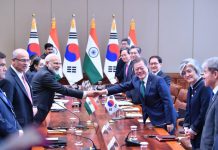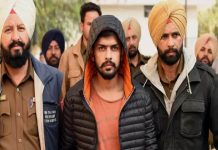A crusader for justice is silenced. Actually not, says Ajit Sahi

1977 – 2010
The Home Ministry, Intelligence Bureau, RAW and police all stand to gain from Azmi’s killing
HAD SHAHID Azmi been gunned down in Russia, China or Iran, his news would have been all over The New York Times the next morning. Working on the principle that the enemy’s enemy is a friend, the western media offer spectacular support to internal dissent against regimes that appear in eternal conflict with western governments and businesses. But Azmi lived and was assassinated in India, fighting the brutal police State that the Indian democracy has become in its dubious war against terrorism. Because the Indian State is hand-in-glove with the western powers, and because India’s dominant middle classes solidly back that relationship, the western or Indian media are unlikely to hail Azmi, who was killed in Mumbai on February 11, as a martyr to the cause of bringing justice to hundreds of the poor, mostly Muslims, falsely accused of terrorism.
But martyr Azmi is, no less than Anna Politkovskaya, the Russian journalist and human rights activist who had already become a western icon for her courageous campaign against Vladimir Putin himself when she was shot dead at her Moscow apartment three years ago. Indeed, Russian, Chinese and Iranian dissidents take much heart from the western might backing them. Azmi’s campaign was, therefore, more courageous, for his work was doubly tainted as he defended “terrorists” allegedly once removed from anti-US terror groups, Al Qaeda and the Taliban.
We need to directly ask just who benefits from Azmi’s killing. The answer is a Who’s Who of Indian security: the Union Ministry of Home Affairs, RAW and the Intelligence Bureau, whose grand constructs on terrorism Azmi demolished each time he won a case. Maharashtra Police despised Azmi, for he represented, mostly successfully, many accused in a string of blast cases. Azmi had been preparing for the defence of dozens arrested since 2008 as members of Indian Mujahideen, which has been linked with last Saturday’s blast in Pune that killed 10 people. Azmi was also actively involved in organising legal defence for many arrested in Gujarat on charges of masterminding and carrying out terror attacks.
Last July, Azmi made enemies at Mumbai’s Central Prison winning a historic ruling from the Bombay High Court against jail warders who had assaulted several terror accused. “I grew up seeing the police barge in night and day in our slum, terrorising and kidnapping people,” Azmi told me on December 11 as we sat chatting after office hours, he on his chair, where he was shot dead exactly two months later. “It bred in me a hatred — nafrat — for the police.”
I first met Azmi in July 2008 while researching a story on the Students’ Islamic Movement of India (SIMI), the shadowy outfit blamed for many terror acts. After stonewalling for days, Azmi allowed me an hour’s cab ride with him to the courts downtown. Eventually, he would provide me with facts that comprehensively nailed the fraudulence of the police in framing innocent Muslim men. The state has never challenged my SIMI report that TEHELKA published a month later.
It was Azmi who pressed me to probe the abuse of the Maharashtra Control of Organised Crime Act (MCOCA), an exposé that my colleague, Rana Ayyub, and I published in TEHELKA last month. I was to return to Azmi this month to work on three cases of 2006, including the train blasts in Mumbai that killed 187 people and the blasts in Malegaon in which 37 people died. Nearly all the accused whom he represented are held on false or forced confessions and zero evidence. Azmi had launched a challenge in the Supreme Court to MCOCA, under which these cases are being tried, claiming that the law is illegal as only Parliament can write anti-terror laws. That judgement is now awaited.
By any account, Azmi led an incredible life: he was only 32 when he was killed. The third of five brothers, Azmi’s life turned the day sword-wielding Hindu fanatics rushed at him as he walked home from school just days after mobs razed the disputed Babri mosque in Uttar Pradesh in 1992. A Hindu neighbour saved him. “Shahid was never the same again,” his oldest brother, Arif, said as I sat with him last week at Azmi’s house a block away from his office. One day, at age 16, Azmi upped and left, ending up first in the Kashmir valley, and then across the border, with a gun on his shoulder. But he soon came back, disillusioned with the insurgency.
The Home Ministry, Intelligence Bureau, RAW and police all stand to gain from Azmi’s killing
NONETHELESS, POLICE arrested him from home in 1994 for conspiring to kill India’s top politicians. The only evidence was a confession he never made. Yet, he was given five years. While at New Delhi’s Tihar Jail, Azmi enrolled for graduation and began writing legal documents for other inmates. Freed in 2001, he came home and joined journalism and law schools. Three years later, he quit a paying sub-editor’s job to join defence lawyer Majeed Memon as a junior at Rs 2,000 a month. “I want to work for the poor,” Azmi told his brother, Arif. It was widely known that Azmi wouldn’t charge any fees from a majority of his clients.
But his past never left him. Some years ago, in a heated moment, Azmi argued in court that even Lord Ram had waged violence to secure justice. The media screamed blue murder. A police case was launched. The judge called in Azmi for a chat. “But it’s true,” Azmi said when the judge cautioned that there were rumours he had been convicted for terrorism. “I wear that conviction as a badge of honour.” The judge told the police he never heard Azmi speak of Lord Ram. The case collapsed. On Monday this week, another judge wept in court. People stood around in silence. Outside that court, Azmi’s long-time lawyer-partner, Saba Qureshi, hung out listless, trying to talk to clients, some beyond grief. “I see him everywhere,” she said, looking out from the balcony. “What will I do?”
But I know what I will do and what Saba should, too. I had just arrived in Chennai on February 11 when I heard that Shahidbhai,as I had come to call him, was dead. Alone in my hotel room, I broke down and wept. My mind went back to the killing in 1991 of Shankar Guha Niyogi, the trade union legend who had organised the tribals in Chhattisgarh and who I had met days before he was shot dead. In the last 18 months, Shahid had come to signify for me a revival of purpose in my life I had rendered barren with years of aimless journalism. That I was hanging out with Shahid meant I was finally moving on my mandate to align with the struggles for justice and empowerment.
My tears ran dry as I roamed the windswept streets of Chennai that night thinking of Shahid. Then Ataur Rahman, the ageing father of two of the accused in the 2006 train blast case, called me from Mumbai. “Ajitsaheb,” Rahman whispered, his voice rock bottom with resignation. “What will happen to us now?” I told him, and I have been telling everyone: Shahid isn’t dead and will never be. I, for one, am far more determined to pursue the path he has shown. Just what bullet can take away the invaluable lesson in courage he has taught me?
WRITER’S EMAIL
ajit@tehelka.com












